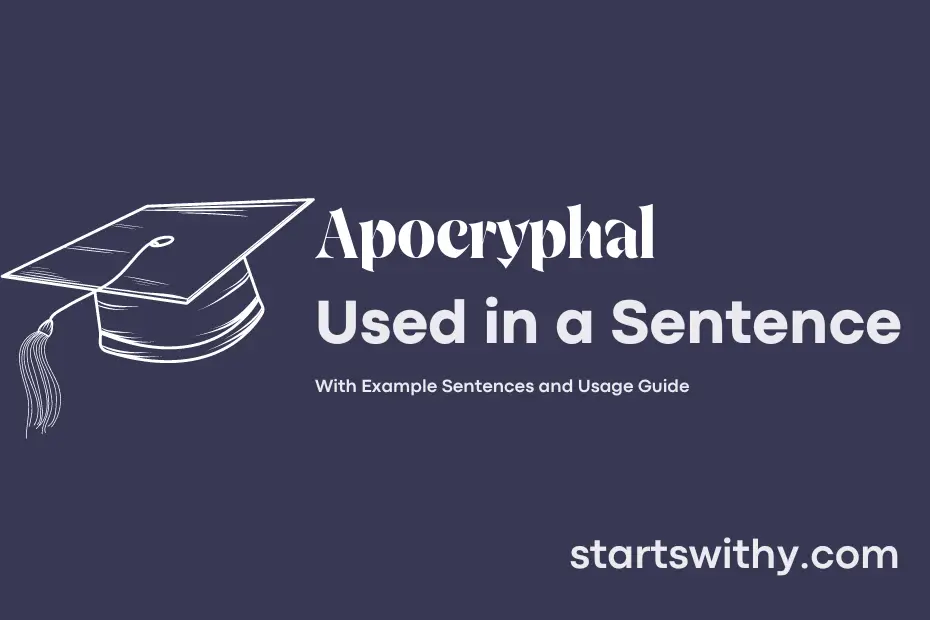Ever heard a story that seems too far-fetched to be true? Welcome to the world of apocryphal tales, where folklore and legends blur the lines of reality. The term “apocryphal” refers to stories, accounts, or writings that are of doubtful authenticity or authorship.
In everyday conversations, apocryphal anecdotes often circulate, creating a sense of mystery or skepticism. These tales may entertain, amuse, or perplex listeners as they question the validity of the information presented.
7 Examples Of Apocryphal Used In a Sentence For Kids
- Apocryphal stories are like fairy tales.
- Grandma likes to tell apocryphal bedtime stories.
- My friend shared an apocryphal story about a magical elephant.
- I enjoy listening to apocryphal legends from different cultures.
- The library has a book of apocryphal myths and legends.
- Apocryphal tales are fun to read before bedtime.
- Today’s story at school was an apocryphal adventure about a brave princess.
14 Sentences with Apocryphal Examples
- Apocryphal stories about famous historical figures are often passed around among college students.
- Some students believe the apocryphal tale of a ghost haunting the old library on campus.
- The rumor that the professor never reads assignments is likely apocryphal.
- Students often share apocryphal tips for acing exams, though they may not always be reliable.
- The apocryphal story of a student pulling an all-nighter and acing the test has become legendary on campus.
- Many believe the apocryphal story that a certain spot on campus is a guaranteed place to find good luck.
- The apocryphal rumor about a secret student club organizing campus events has students intrigued.
- In the world of student gossip, apocryphal tales are common and often exaggerated.
- A group of students shared an apocryphal story about a famous alum who never attended class but still graduated with top honors.
- The apocryphal legend of a hidden treasure buried on campus has inspired many curious students to go on a treasure hunt.
- One student swears by the apocryphal study hack of chewing a certain flavor of gum while preparing for exams.
- Apocryphal claims about the effectiveness of certain study methods should be taken with a grain of salt.
- Students love to exchange apocryphal stories of mysterious happenings on campus, adding to the folklore of the university.
- The apocryphal tale of a professor cancelling exams if it rains on the day of the test has students hoping for a downpour.
How To Use Apocryphal in Sentences?
Apocryphal refers to something of doubtful authenticity or reliability, often used to describe stories or texts that may not be true or accurate.
To use apocryphal in a sentence, follow these steps:
-
Identify the context of the information you want to describe as doubtful or unreliable. This could be a myth, legend, or historical account.
-
Integrate the word apocryphal into your sentence in a way that clearly conveys the lack of authenticity or reliability of the information. For example, “The tale of the haunted house was considered apocryphal by the local historians.”
-
Make sure the sentence flows well and accurately conveys the meaning you intend. Consider the tone and style of your writing to ensure that the word apocryphal fits naturally into your sentence.
-
Practice using the word apocryphal in different contexts to become more comfortable with its usage. This will help you effectively incorporate it into your writing whenever needed.
Remember, using apocryphal can add depth and clarity to your writing by indicating skepticism or uncertainty about the information being presented.
Conclusion
In conclusion, apocryphal statements are those that are of doubtful authenticity or authorship, often circulated as being true but lacking concrete evidence to support their validity. These sentences may have a mysterious or mythical quality to them, leading to their widespread dissemination despite their questionable origins. It is important to exercise caution when encountering apocryphal information, as it may not be reliable or accurate.
Therefore, it is crucial to critically evaluate the sources and credibility of the information we come across to differentiate between what is factual and what is apocryphal. Being mindful of the potential for misinformation can help us make more informed decisions and avoid perpetuating false claims or beliefs based on apocryphal sentences.



